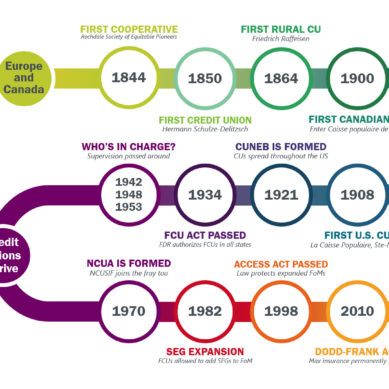For the most part, credit unions are financial institutions where members save, borrow, and use other financial services. However, credit unions are also considered trusted advisors when it comes to a member’s financial well-being. So, in this age of identity theft and account take over, how do you counsel your member when they say they were alerted that someone pulled a credit report without permission or a member calls with evidence of identity theft? What do you have on your website recommending members do when their financial livelihood is jeopardized?
One of the first that comes to mind is contacting the credit bureaus or utilizing a third party to put a security freeze, credit lock, and/or fraud alert on the credit report all together. This will prevent any further leaks of nonpublic information and stop the bad guys from taking loans out in the member’s name. Chances are if you get called by the member asking you what they should do this would be your first recommendation. However, when asked about the differences between a freeze, a lock, alerts, using third parties, etc. how much do you really know about the nuances of these and how will you describe the best tack for the member to take? Lets dive into the nuances of each and then provide you with some resources for you to give your member when asked.
Credit freeze
Credit freeze—sometimes referred to as security freeze—and credit locks both restrict access to your credit reports. The biggest difference is that credit freezes are free and generally mandated by state and federal law, while credit locks are offered through national credit bureaus and can be a paid for service with additional features. These features differ from bureau to bureau and in some cases can be very beneficial. A good source to get a better understanding of these is the Federal Trade Commission site.
Credit freezes are the most widely recommended action to take and will require the member to contact each bureau independently. There is no cost to freeze access to your report and remains indefinitely until you decide to thaw access. Credit freezes also can take up to five days to go into effect. “Thawing” is the term used to remove the freeze and access to remove the freeze requires an account with a password and is not always guaranteed to happen the minute you thaw it. That is important to understand especially if you know you will be applying for credit soon as this can take up to three days. Also, credit freezes do come with federal and state mandated guarantees and additional protections that credit locks do not.
Credit locks
Credit locks are generally the same but may not in all cases offer the same federally mandated protections as freezes. Based upon the research performed, credit locks are free from Equifax and Transunion and are a paid for service through Experian. One of the main differences is that credit locks last only as long as you subscribe to the service. Also, credit locks can be locked and unlocked instantly. Credit locks also can be bundled with other services as found in Experian’s IdentityWorks product.
Fraud alerts
Fraud alerts are another method to protect nonpublic member information when a member only suspects their information may have been compromised. Fraud alerts are also mandated by federal law and require the business that is pulling a members report to verify the identity of the member prior to granting credit. Fraud alerts only last one year and require the bureau you report it to contact the other two bureaus to place the alert at their repository as well. Fraud alerts only last one year and can be renewed by calling the bureau.
Third-party vendors
There are many other third-party vendors that will provide protection, detection, and legal services when a member’s identity has been compromised and in some cases, the credit union already has become a reseller. The best site I have found that rates them is the nonprofit consumersadvocate.org.
If you haven’t thought about how you consult with your members relative to identity theft or some unknown entity pulling a member’s credit report, I encourage you to do so and even potentially set up an educational site on how best to protect from identity theft. The two best resources I have found that describes the nuances between freezes and locks are Nerdwallet and Credit Karma.
The three bureaus—Experian, Transunion, and Equifax—all offer explanations for the difference between credit locks and security freezes and and explanation for fraud alert. The latter two also have their own products as well.
Be informed for your members
Our members trust us to be able to help them in both good times and bad. Take the time to read through these articles, their resources, and products to educate yourself on the processes. The next time a member comes to you with fraud alerts or identity theft concerns, you’ll be able to walk them through steps they can take to secure their accounts, the options available to them, and products they can use in the future to protect their finances.

























































